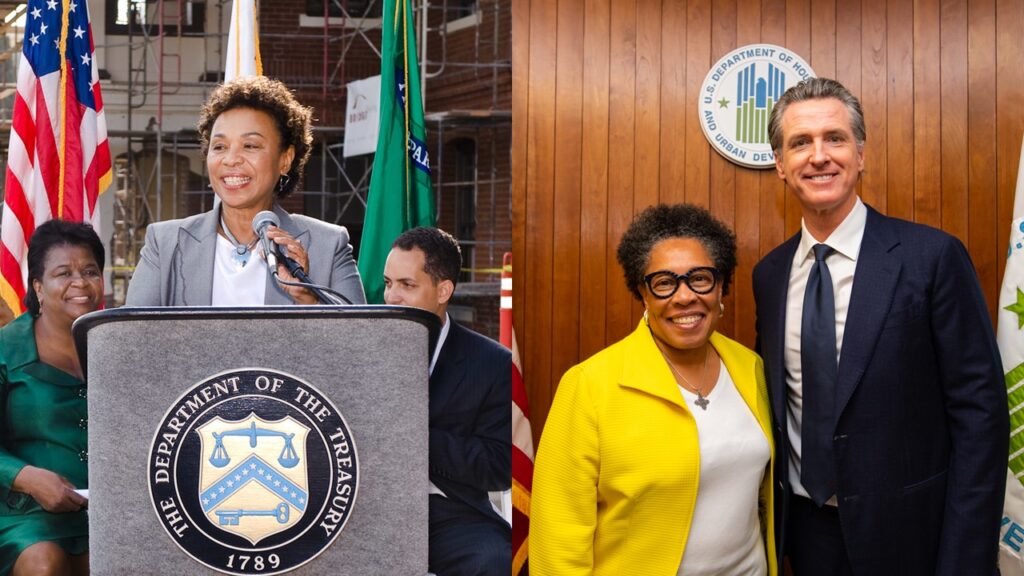
LEFT: Congresswoman Barbara Lee (CA-09) delivers opening remarks at the US Department of the Treasury’s inaugural Capital Magnet Fund award announcement in Oakland, California. More than $80 million in grants were announced for affordable housing for low-income communities. October 20, 2010. Photo courtesy of USDOT. RIGHT: Secretary of HUD Marcia Fudge with Governor of California Gavin Newsom. July 15, 2022. Photo courtesy of USHUD.
California Governor Gavin Newsom’s appointment of labor activist Laphonza Butler to the Senate seat vacated by the death of Sen. Dianne Feinstein has angered some in California’s Democratic Party. Included in that number is Rep. Barbara Lee (CA-09) who is running for the seat. In the Spectator, Dave Seminara discusses Newsom’s decision, writing:
California governor Gavin Newsom’s recent appointment of Laphonza Butler, a black lesbian, to the late Senator Dianne Feinstein’s seat generated headlines but it wasn’t a surprise. Newsom pledged to appoint a black woman if Senator Feinstein resigned more than two years ago. And so, he was all but required to eliminate roughly 97 percent of California’s population, which is just 6.5 percent black, from consideration straight off the bat. The appointment represents mainstream orthodoxy on the left here and in Europe, where diversity has replaced quality as a primary consideration not just in politics but also in the culture.
Newsom’s press release about Butler’s appointment led with her intersectional qualifications, detailing how she’ll become “California’s first openly LGBTQ United States Senator and the first black lesbian to openly serve in Congress” before listing her actual qualifications gained during her career as a union leader, political operative and nonprofit executive. The governor didn’t choose any of the existing candidates, infuriating Representative Barbara Lee, an African-American congresswoman who is running for the seat. “The idea that a black woman should be appointed only as a caretaker to simply check a box is insulting to countless black women across this country who have carried the Democratic Party to victory election after election,” Lee said on X.
Lee’s remarks could be interpreted as sour grapes, but the fact that even an African American in his own party is calling Mr. Newsom out for tokenism is striking. It’s only the third time a Democrat has had an opportunity to appoint a senator in the last decade. The last time the Democratic Party nominated a white male to a Senate seat was 2014, with the appointment of John E. Walsh. But that was nearly a decade ago and Walsh is from Montana, a state with a notable shortage of black lesbians and others with intersectional qualifications that leap off the page.
The divisive identity politics game is played well by politicians here and abroad, but what troubles me more is how inescapable its become in other spheres of life. I used to live in Central Oregon, where the annual Sisters Folk Festival is a very big deal. Here’s how the local newspaper described this year’s lineup on social media: “A new generation of folk singers — led by a wave of women, people of color and LGBTQ+ artists — is pushing the genre into new places, both musically and thematically,” it began.
The post detailed how this year’s artists include a “queer, populist folk singer,” a “queer Latinx pop artist,” a “nonbinary TikTok star” and others high up on the intersectionality charts. But I noted that there was no mention of chart-topping hits, awards won or any other measure of quality. We were supposed to buy a ticket essentially to confirm their excellence as intersectional all-stars.
Pick nearly any other cultural offering and you’ll see a similar approach to identity. For example, look at the offerings at this month’s prestigious BFI London Film Festival. There are films about a queer long-distance swimmer, a queer Macedonian housekeeper, an “all-black frontier action drama,” a film about a queer South Asian nightclub performer, another about a Russian “radical queer performance artist,” a film about queer sisterhood and abortion rights in Brazil, another about “black and brown disabled” rappers living in a care facility, a French “sensual, queer love story” set in a youth correctional facility, a film that “expands our contemporary understanding of how queerness is expressed” in Nigeria, and perhaps most peculiar of all, a film about a “multi-generational, queer housing project and the study of old-growth forests… (that) testifies to the ecological importance of diversity and care.”
Read more here.
If you’re willing to fight for Main Street America, click here to sign up for the Richardcyoung.com free weekly email.





